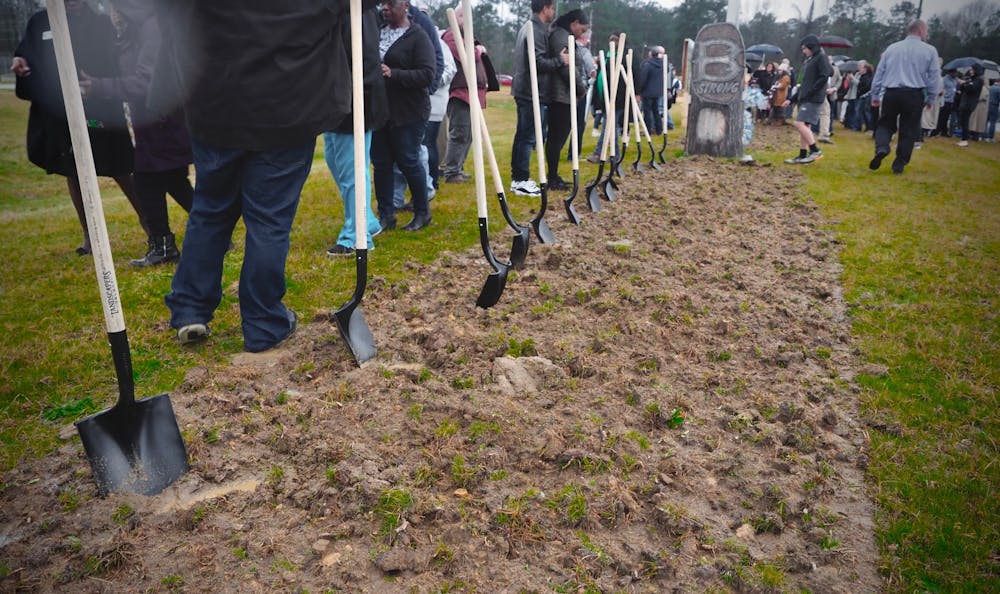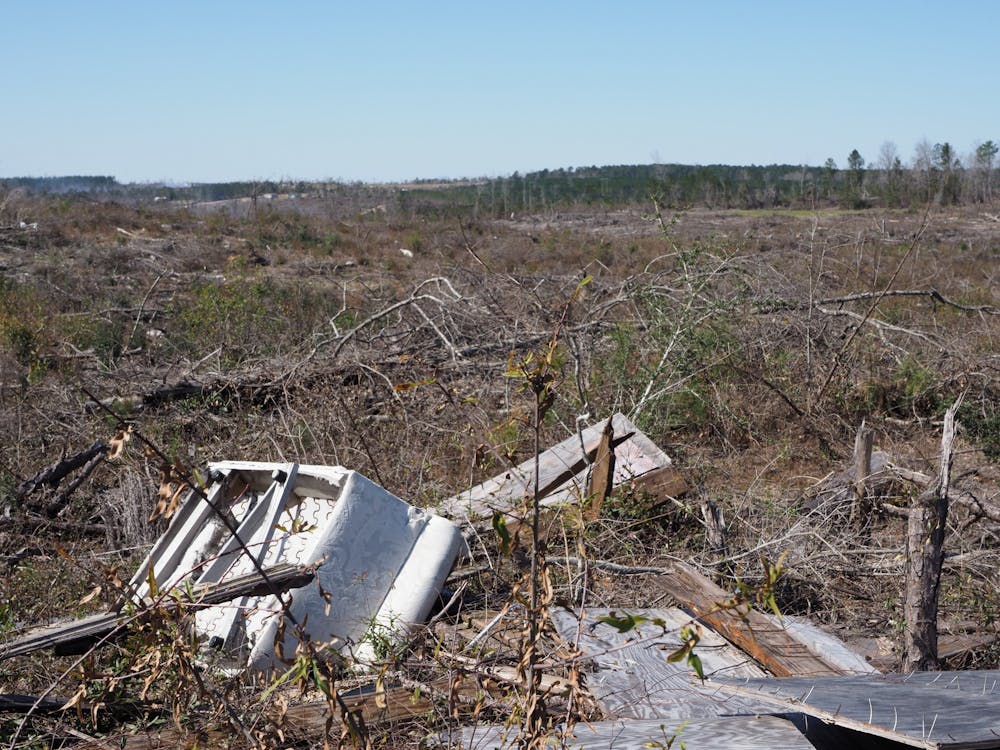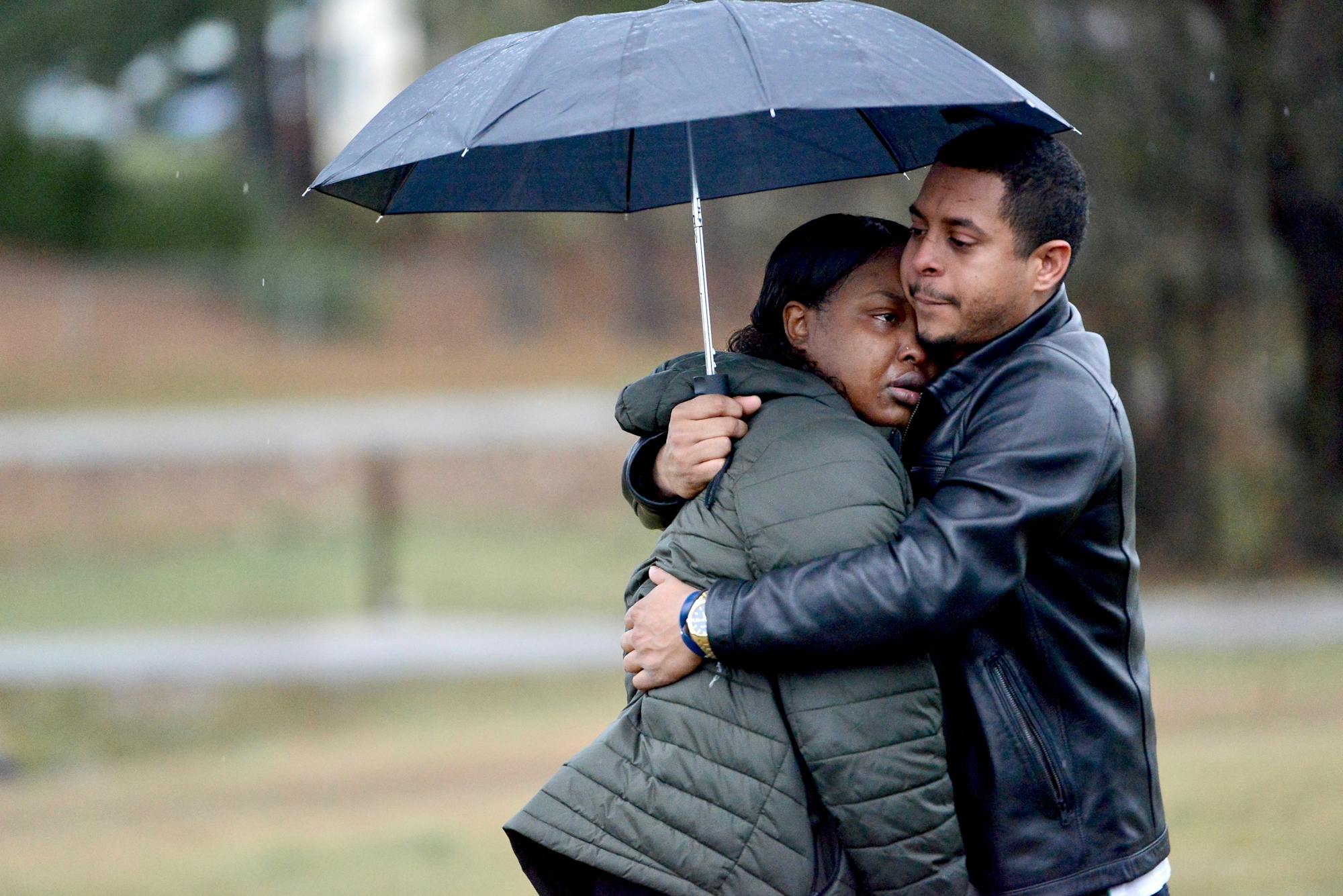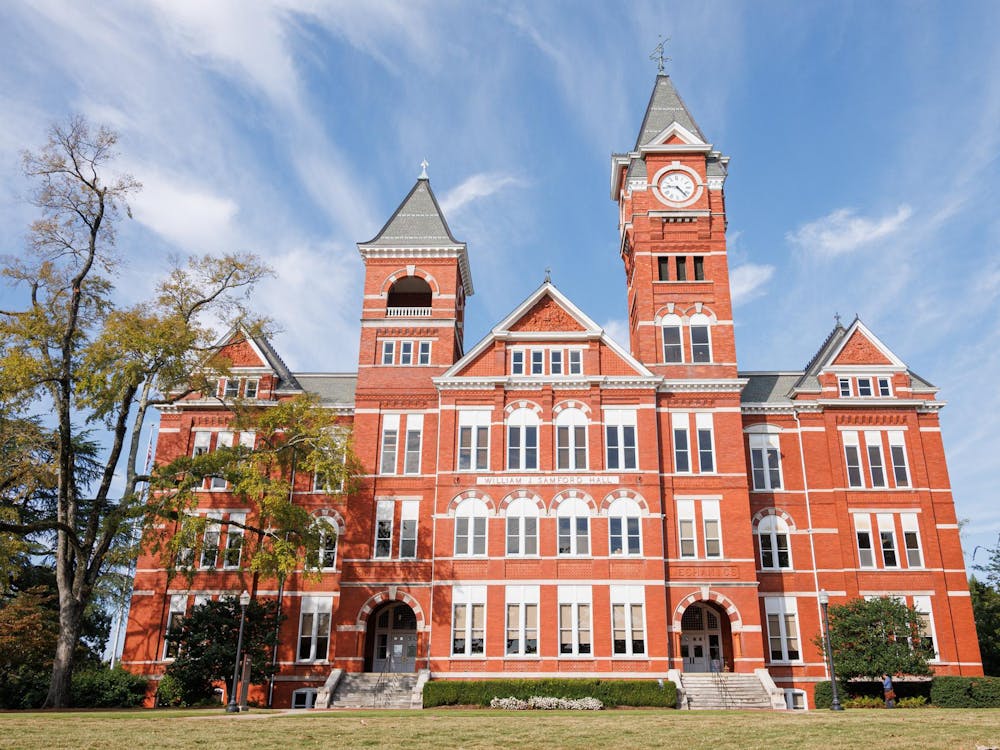A new house is being built on Lee County Road 38 in Beauregard, Alabama.
Behind the house, fallen trees with roots ripped from the earth a year ago are collected in piles.
Across the street, Cindy Sanford’s small white dog runs around the front porch of her trailer. Sanford had been awake since 3 a.m. Saturday morning, unable to sleep, cleaning the house that wasn’t there a year ago.
“I lost everything,” she said.
Even then, she was lucky.
Her home was destroyed by the EF4 tornadoes that ripped through Lee County and killed 23 people.

Sanford, 58, was listening for news of the storm while still in her home with her oldest grandson. Suddenly, she heard that she should take cover.
“You could tell in his voice that it was serious,” she said. “I looked at my grandson and I said, ‘Let’s go.’”
They got into her car and headed to Providence Baptist Church so they could take shelter in the basement. The rain was so thick that she could barely see. They missed the tornadoes by minutes.
“I probably got over that hill down there, [and] it hit already,” Sanford said.
Before she made it over the second hill, she thinks everything was already gone.
“If I had not left,” she said, before lowering her voice. “I wouldn’t be standing here.”
Three of her neighbors died in the storm.
Sanford pointed to an empty space near her trailer. Charlotte Ann Miller lived right there. Where a new double-wide trailer is now, Irma Gomez-Moran lived there a year ago. Behind Sanford’s trailer was the home of Mamie Roberts Koon.
They were still at home when Sanford drove off.
She was one of the last to leave, but also one of the first to come back. She moved back to the area in May.
“It still didn’t feel quite like home yet,” she said.
She said it still doesn’t.
Tony Robertson, 75, also missed the storm by a few minutes. He didn’t know the tornadoes were coming his way.
“We had thought it was going to rain or something,” he said. “We didn’t know it was going to get rough.”
Robertson and his wife went to Dollar General right as the tornadoes swept over their home. When they came back, the damage had already been done. Then, they had to deal with the aftermath.
“Well, it ain’t no good feeling,” he said. “I’m just lucky my house is still standing. It tore the roof off.”
His car shed and enclosed horse trailer were blown away. At the edge of the woods, the trailer stood upright. He said it looked like a bomb went off.

William Baugh, a resident of Beauregard, was at his home when the tornadoes touched down in the fields across the street.
“What I saw was a wall. It was just a black wall,” Baugh said. “You couldn’t see very far once it was on us. You could see something fly by every once in a while.”
Baugh was caught outside watching one of the EF4 tornadoes tear through the countryside in the distance when he realized another was barreling toward him from the opposite side of his home.
“Everything felt real weird. The wind wasn’t doing anything. There was no rain, and I didn’t hear any kind of wildlife. It was a strange feeling,” Baugh said. “So I bounded up the stairs and went in and closed that door and told my wife we were fixin’ to get hit. And we did.”
Baugh, his wife and daughter took shelter inside their home as the tornado hit, knocking two trees into their home.
“My wife and daughter both have PTSD out of the whole thing. They can’t stand storms now; they freak out,” Baugh said. “They used to be not afraid of the weather at all. Now they are — very much so.”
Baugh said he and his family were not able to make it to their safe room before the tornado crashed into their home.
“I was inside there, so I saw the limbs come through the window, but I never heard it crush the chimney,” Baugh said.

Beyond damaging the house, the tornado also uprooted approximately 90 trees according to Baugh, producing problems both above and below the ground.
“When it rains, this is a whole underground river,” Baugh said. “We found out that out here is basically like an underground lake.”
Without the trees’ roots binding the ground together and sucking up the water, the land transformed into a hidden swamp of sorts, sucking in trucks, bulldozers and even shifting the foundations of sheds in his yard.
Baugh said in the year following the tornado, many challenges surprised him.
“My biggest problem has been the bank. The insurance company was great, but the bank is being a pain,” Baugh said. “They are trying to micromanage me from out in California. I thought they would cooperate with me, but no, they are fighting me every step of the way.”
Baugh was given about a week and a half off of work to begin the process of rebuilding his home. It was nowhere near enough time to clean up the damage on his own, he said.
“Since all our damage was on the back, nobody could tell we got hit, so everybody just walked by,” Baugh said. “We found out if you aren’t homeless or dead, then they pretty much ignore you.”
Baugh said his family was lucky to be able to remain in their home while they rebuilt, knowing some of his neighbors lost everything.
Baugh didn’t want to complain about the lack of help he received or the insufficient amount of time off he had to rebuild his home.
“I knew it was going to be difficult. I expected it to be worse than the storm. I just didn’t expect it to be this bad,” Baugh said.“I’m still working out here, and it’s going to be well over a year before I get finished.”

On March 2, 2019, Ellis Williams lived in a paid-off home near Lee County Road 38 in Beauregard. He had a shed he called his shop and a truck. That changed after the tornadoes.
“My old home was blown away,” Williams said. “The shop was blown away. My truck was blown away, and I was in my truck when it got blown away.”
Williams had a picture on his phone of his truck, which was mangled and twisted from the damage, but the driver’s side was left intact enough for him to escape from it. He said he awoke in the hospital, where he stayed for three days to recover, at least partially, from the broken vertebrae in his neck and spine.
“I’ll tell you, it’s a funny feeling when you wake up in a hospital, when you don’t have a home, when you don’t have no vehicle, when you don’t have nothing left,” Williams said.
Williams left the hospital with nothing. Without a home, and unable to even tie his own shoes, he had to rebuild. He said his Alfa insurance paid for all of the reconstruction and repairs, and he found help from family and friends to construct the parts of the home they could while he recovered from his broken vertebrae.
“If it hadn’t been for family and friends, I wouldn’t be here; I wouldn’t be here with this,” Williams said. “Pretty much everything that’s been done around here has been family and friends.”
He couldn’t go to his job at the sod farm for five and a half months because of his injury. Once he was in good enough shape to work, he started to work on his home himself, “just a little at a time.”

He’s got a home now with a porch, a new shop and a truck. But some things, like the trees, torn down in a matter of minutes, can’t be so easily replaced. He’s started to plant new trees in his yard, which was once all forest, in hopes of seeing them grow tall and shady.
“I put 20 more trees back in my yard,” Williams said. “Because one day, somebody might get something out of a shade tree. I’m almost 62 years old. I don’t know if I’ll ever see them get to be that big or not — I hope I do.”
And there’s still plenty to be done.
“It’ll take me another year to get back to the point where I was at, when I could walk out of my house on a Saturday morning and didn’t have to do nothing,” he said.
Sometimes, Williams said he feels like his friends, those who weren’t affected by the tornado, don’t realize just how much it still affects his life, how much work still has to be done.
“Because they’ll call and ask me, ‘Why don’t you come over to the house this Saturday, and we’ll cook out and drink a few cold ones?’” Williams said. “I say, ‘Man, I ain’t got time.’ And everybody says, ‘Well, what’ve you got to do?’ I say, ‘Ride down to the house, and I’ll show you.’”
Throughout the process of picking up the pieces of destruction, it’s hard to escape the tragedy that created it, Williams said. At times, he may hear a sound and find himself reminded, once again, of March 3, 2019.
“The other day I was in Columbus, over there by Airport Freeway, and I was getting ready to unload my truck over there, and all at once, I heard it,” Williams said. “That jet took off from the airport over there, and it sounded just like that day here. Put cold chills on me.”





Share and discuss “One year later: Beauregard mourns” on social media.